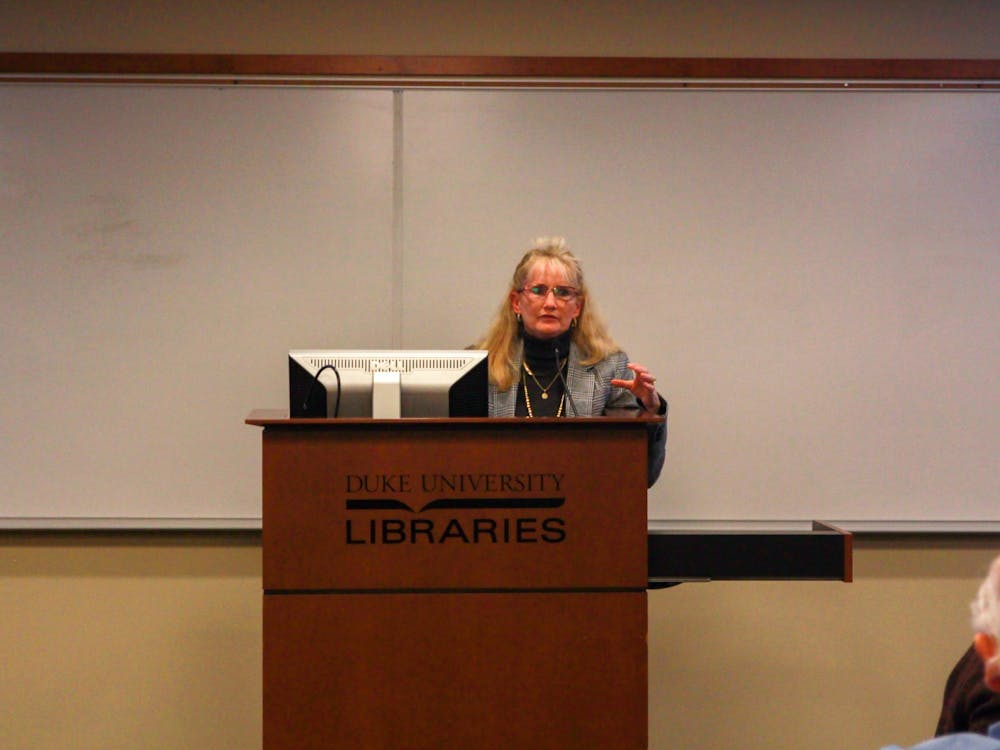Editor's Note: This article was updated at 4:15 p.m. Friday to better contextualize the potential Duke 101 course and the issues surrounded course codes.
A new introductory course on Duke may become part of the first-year experience.
Arts and Sciences Council and Academic Council will work together moving forward with specific initiatives related to future changes to the Trinity curriculum and student-faculty engagement initiatives. A&S Council Chair José María Rodríguez García and Nayoung Aimee Kwon, executive member of the A&S Council, interviewed Academic Council Chair Kerry Haynie in front of the Trinity College faculty governing body at A&S’s Thursday meeting.
“In so much as Arts and Sciences Council being a smaller council in terms of size, I think the mission and purview of this council is the cornerstone of the University,” Haynie said.
Here are four takeaways from the A&S Council meeting.
Duke 101 course?
Faculty are starting to hear about a potential introductory course on Duke, or Duke 101, to prepare undergraduates to fully and respectfully engage with the Duke community.
Faculty have heard that one aspect of the course could focus on diversity. Other potential components could center on student wellbeing or the historical relationship between Duke and Durham.
So the faculty would have a frame of reference to understand what this course might entail, Kwon mentioned the diversity, equity and inclusion training faculty can undergo. She said it was “very successful,” though she acknowledged some faculty chose not to opt in because of the time commitment to complete the training.
Making a diversity course mandatory for students, however, doesn’t guarantee an environment to foster changes in students’ ways of thinking as the course intends, said Haynie, also an associate professor of political science. Instead, he suggested that changes to departments’ existing curricula could accomplish the goals of the course.
Rodríguez García noted after the meeting that no official proposal has been presented to faculty about Duke 101, as it must still be in its very early planning stages.
“In my view, we are probably three semesters away from the soonest that we can implement it,” Rodríguez García told The Chronicle after the meeting.
The problem of adding curriculum codes to co-curricular opportunities
Rodríguez García mentioned the problem of students taking certain courses to make it easier for them to qualify for the Dean’s List, or taking not-for-credit experiences for the sole purpose of collecting codes to credentialize their degrees.
To ensure the “highest academic standards,” Rodríguez García encouraged the Council to decide how undergraduates will be able to attain certain course codes through curricular and co-curricular opportunities.
He said the faculty have grown increasingly wary of misuses and even abuses of course codes connected to Spring Breakthrough, Winter Forum or Coursera-related experiences. In fact, codes of any kind had not appeared on student transcripts until “very recently,” he told The Chronicle after the meeting.
“We have a bunch of co-curricular components which could be courses or other types of units that the students either take or do not take depending on their major, their inspiration or their pathways, and then we have not for credit experiences,” he said after the meeting.
Faculty to be rewarded for university service
There is concern that faculty currently aren’t properly compensated for doing service for the University, Rodríguez García said. Serving on committees or advising students is not treated to be “as important” as research, publishing articles and books or getting federal grants, he specified after the meeting.
This issue particularly becomes a concern because the “same old, same old folks” usually serve in these service positions, Haynie explained.
The A&S Council thus considered the possibility of adding a criterion of faculty service to be compensated for their work in the form of faculty retention or contract renewal. Compensation could entail course releases, sabbaticals or faculty raises, Rodríguez García said after the meeting.
“We believe that, if advising is going to become an even more central component of both faculty student interaction and the undergraduate experience in general, that advising should perhaps become an additional category that departments and schools will take into account to actually compensate faculty,” he said after the meeting.
‘Chairs’ Corner’
A new feature for the council, “Chairs’ Corner” is a new opportunity for faculty to explain the work of their respective departments and A&S subcommittees.
The council heard Thursday from Susan Wynn, associate professor of the practice of education, about the Program in Education and Courses Committee and from José Miguel González, chair of the Global Education Committee, about study abroad for undergraduates.
Global Education is currently working on aggregating data on the types of courses and credit students receive abroad and how departments could see those courses as “an extension of their own curriculum,” González said.
Corrections: This article was updated to say that the faculty were discussing what they heard regarding Duke 101, not that they are considering implementing it. Further, codes of any kind had not appeared on student transcripts until recently, not just summer curriculum course codes. The Chronicle regrets the errors.
Get The Chronicle straight to your inbox
Signup for our weekly newsletter. Cancel at any time.

Stefanie Pousoulides is The Chronicle's Investigations Editor. A senior from Akron, Ohio, Stefanie is double majoring in political science and international comparative studies and serves as a Senior Editor of The Muse Magazine, Duke's feminist magazine. She is also a former co-Editor-in-Chief of The Muse Magazine and a former reporting intern at PolitiFact in Washington, D.C.

